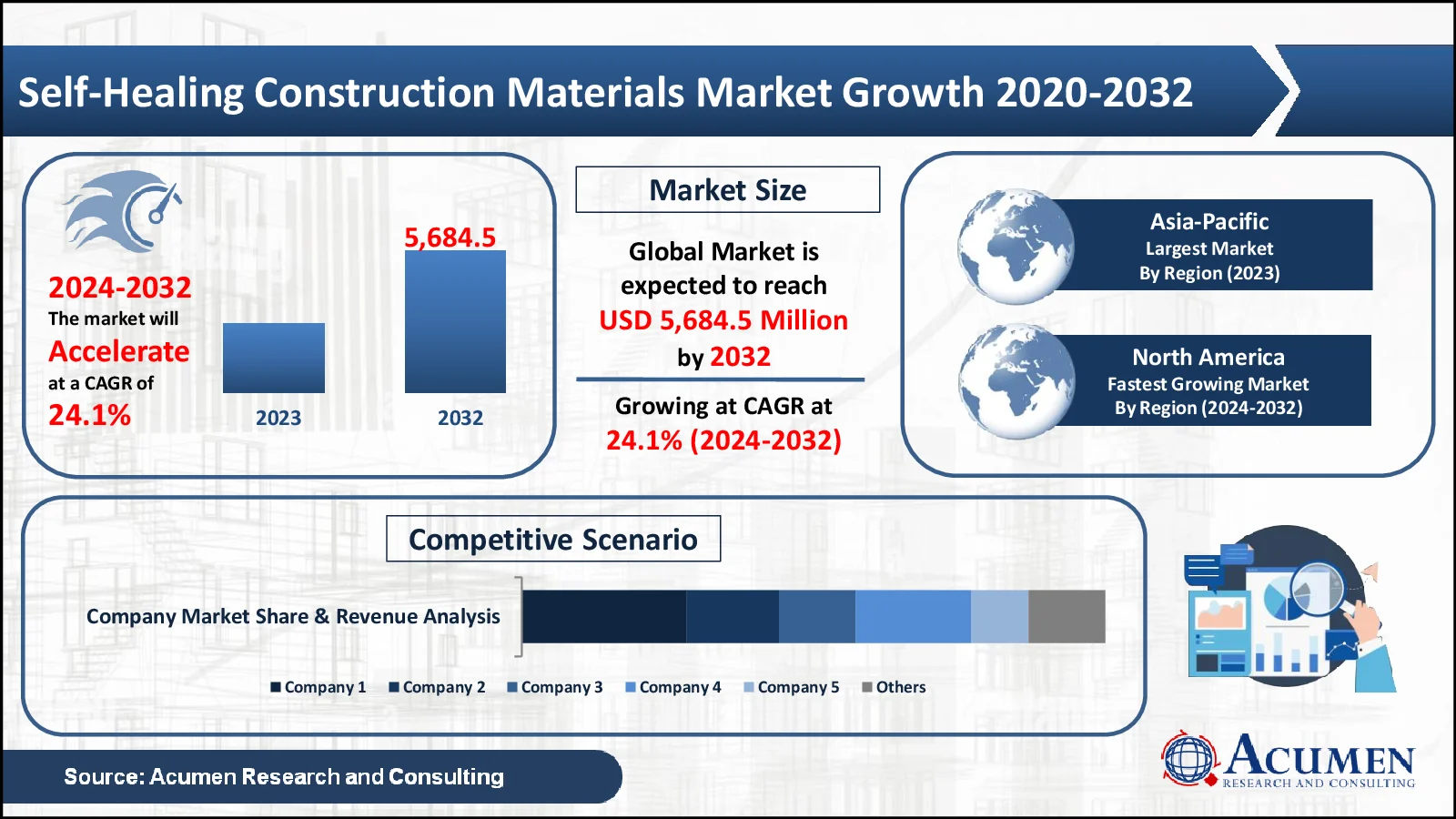Self-Healing Construction Materials Market Size to Reach USD 5,684.5 Million by 2032
The Self-Healing Construction Materials market, valued at USD 829.5 Million in 2023, is projected to surpass USD 5,684.5 Million by 2032, indicating a robust CAGR of 24.1%
Self-healing construction materials are innovative materials designed to automatically repair damage such as cracks or fractures that occur over time, without human intervention. These materials incorporate specialized agents, such as healing capsules or fibers, which activate when damage occurs, allowing the material to regenerate and restore its original properties. This self-repair mechanism extends the lifespan of structures, improves durability, and reduces maintenance costs.

In today's context, these materials are increasingly important due to the growing demand for sustainable, eco-friendly construction solutions that can minimize the environmental impact of repairs and replacements. Self-healing materials are particularly relevant in the face of aging infrastructure, extreme weather conditions, and the push for energy-efficient buildings. They also contribute to the reduction of carbon footprints by lowering the need for resource-intensive repairs.
Self-healing construction materials find applications in a variety of sectors, including civil engineering, roads, bridges, and buildings. By improving the longevity of structures, they help ensure safety, reduce waste, and promote more sustainable urban development. Their growing adoption is expected to be crucial in meeting the sustainability goals outlined by governments and industries worldwide enhance growth of self-healing construction materials market in forecast year.
Self-Healing Construction Materials Market Statistics
- The global self-healing construction materials market generated USD 829.5 million in 2023 and is projected to grow at a robust CAGR exceeding 24.1% from 2024 to 2032
- The Asia-Pacific region led the market, contributing USD 265.44 million in revenue in 2023
- North America is expected to witness substantial growth with a projected CAGR of 25.3% during the forecast period
- Among type, the concrete sub-segment is anticipated to dominate the market, generating a significant share in 2023
- A discernible trend in the self-healing construction materials market is growing demand for durable infrastructure solutions due to aging buildings and extreme weather conditions
Access Table Of Content: https://www.acumenresearchandconsulting.com/table-of-content/self-healing-construction-materials-market
Self-Healing Construction Materials Market Dynamics
Advancements in Material Science and Technology, Enabling Efficient Self-Healing Mechanisms Fuels the Self-Healing Construction Materials Market Value
Advances in material science and technology have greatly improved the efficiency and effectiveness of self-healing processes in construction materials. Innovations like as microencapsulation, vascular networks, and nanomaterials enable more dependable and long-lasting self-healing characteristics. These advancements have resulted in higher-performing materials that can self-heal cracks, prolonging the life of structures and lowering maintenance costs. Furthermore, the development of more cost-effective manufacturing technologies has made these materials more affordable for large-scale construction projects. As a result, the market for self-healing construction materials is quickly expanding, driven by the need for long-lasting infrastructure.
Potential for Integration in Green Building Certifications and Sustainable Construction Practices Offer Significant Self-Healing Construction Materials Market Opportunity
The growing emphasis on green building certifications like LEED and BREEAM creates a substantial opportunity for self-healing construction materials. For instance, India remained third on the US Green Building Council's (USGBC) annual list of Top 10 Countries and Regions for LEED (Leadership in Energy and Environmental Design) in 2023. The country has 248 LEED-certified projects spanning both buildings and spaces, totaling 7.2 million gross square meters (GSM). As sustainable construction practices gain popularity around the world, self-healing materials will play an increasingly important role in eco-friendly infrastructure. Their capacity to increase durability while reducing environmental effect contributes to meeting regulatory standards as well as consumer desire for greener solutions. This increased emphasis on sustainability in building creates new opportunities for the widespread use of self-healing materials. As a result, their inclusion into green construction projects is likely to produce significant market growth.
Self-Healing Construction Materials Market Segmentation
The global market for self-healing construction materials has been segmented into, type, applications, and region.
- Types are divided into concrete, asphalt, fiber-reinforced composites, polymers, and others
- End-users are categorized into residential, commercial, industrial, infrastructures
- The self-healing construction materials market is geographically split into Europe, North America, Latin America, APAC, and the Middle East and Africa
Self-Healing Construction Materials Market Regional Outlook
In terms of self-healing construction materials market analysis, Asia-Pacific dominates in self-healing construction materials market, supported by stringent environmental regulations and a shift towards sustainable construction.
North America growing notably in self-healing construction materials market due to its strong focus on innovation, sustainable building practices, and extensive research and development. For instance, the U.S. Green Building Council (USGBC), the foremost authority on green building and the global developer of the LEED green building program, announced its annual list of the Top 10 LEED states on 2023. For the first time in history, New York ranked first in terms of LEED-certified gross square footage per capita over the previous year, setting the standard for green building across the country. Additionally, major players in the construction and materials industry in North America are investing in advanced self-healing technologies to meet these demands.
The European Union's commitment to reducing carbon footprints and promoting eco-friendly solutions further accelerates the adoption of these innovative materials further boosts self-healing construction materials industry in forecast year.
Self-Healing Construction Materials Market Players
Self-healing construction materials companies profiled in the report include Penetron, BASF, Sika AG, Hycrete, Kryton, Evonik, Cemex, Saint-Gobain, and Xypex Chemical Corporation.
Enquire Before Buying https://www.acumenresearchandconsulting.com/inquiry-before-buying/1003
Receive our personalized services and customization by clicking here https://www.acumenresearchandconsulting.com/request-customization/1003
Mr. Richard Johnson
Acumen Research and Consulting
India: +91 8983225533
E-mail: [email protected]


